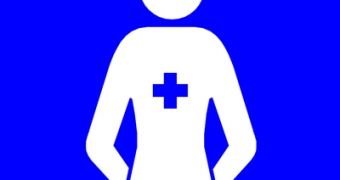Amidst intense talk about the obesity epidemic and the measures the state can take to fight it off, or at least keep it under acceptable limits, it turns out that even the staff that should be physically fit are far from it. Emergency response personnel are getting heavier by the year, but so are auxiliary medical staff, such as nurses. It is a clear case of not practicing what one preaches, and it has contributed to a downfall in regard as to the NHS, nurse Jeremy Chell (not her real name) says for the Daily Mail.
It is by now a well-known fact that obesity is causing havoc among adults in Britain (and not only), but that does not mean that even those people who should offer advice and counseling on the issue should be in the same state, if not actually worse than their patients. The NHS is filled with overweight or obese chain-smoking nurses and doctors, so it’s only understandable why few Brits still have the same high regard for the system that they once had, Chell shares.
“I’ve often worked with overweight nurses, even obese ones and, to be frank, they’re hardly an advert for the profession, let alone any attempts to encourage patients to lead a healthier lifestyle. I realize you can’t expect all NHS staff to be battle fit, but I do think it’s reasonable for them to look healthy. As health care workers, we are expected to give lifestyle advice when appropriate. But I’d find it pretty hard to swallow advice to make adjustments to my diet as well as doing more exercise if the medic was fatter than me.” Chell tells, recalling the times when she was a nurse in 1982 and had to pass a physical exam first to show that she was fit enough for the job.
These days, she adds, nurses are extremely overweight, barely able to waddle through from one patient to another, breathless from the effort and the smoking. Of course, the fault is not entirely theirs, it is said further on. Most are middle-aged and spend many hours a day doing paperwork, which makes it so that they’re extremely prone to piling on the pounds. But what about the doctors and the younger nurses, who are not only overweight, but also smoke outside the hospital entrance? What kind of message do they send to the regular Joe or Jane who comes in for a consult, Chell asks.
“You can’t correlate performance with obesity directly, so, instead of saying someone is not doing a good job because of their size, a manager might say the employee has poor motivation and lacks direction, or even that workmates feel they aren’t doing their share. They skirt round the issue, so it’s never tackled head on. But it should be addressed. Patients judge medics on the way they look. There is lots of talk about the obesity epidemic and diabetes crisis.” Chell concludes by saying, urging patients and medical staff alike to think outside the box and become “part of the solution, not the problem.”

 14 DAY TRIAL //
14 DAY TRIAL //